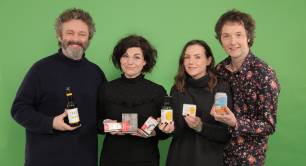Short n Sweet: 15 November 2019 – Company law under fire
Bite-sized stories this week include calls to overhaul UK company law, a cash boost for affordable credit ideas, 'radical hospitality' in San Francisco grows, and the winners of Scotland's social enterprise awards.
Joint campaign calls for update to UK’s “Victorian-era” company law
Social Value UK, together with Social Enterprise UK and Social Enterprise Mark CIC, is lobbying the government to update UK company law – arguing its principles date back to Victorian times.
Their open letter calls for an “urgent review” of the legal framework, citing research published this week by the High Pay Centre and the TUC that claims the “shareholder-first” business model contributes to poverty, inequality and climate change.
The UK’s Companies Act currently requires directors to put shareholder profits above all other interests. This month’s letter appeals for it to be reworded to reflect “changing attitudes”, arguing that most investors, including the general public, don’t want to maximise profit if that means causing significant harm to people and the planet. It also calls for a change to accounting rules, which would require companies to report not just on profit and loss but also on their impact on other stakeholders. Echoing efforts from others, including law firm Bates Wells, the campaign also calls for a new requirement for businesses to state a purpose that includes more than just maximising financial profit.
Google announces new SDG-focused accelerator
Google has launched a startup accelerator focused on the Sustainable Development Goals (SDGs), which aims to help with the “unique challenges founders face when building a social impact company”.
Writing on Google’s blog on 5 November, the multinational’s chief sustainability officer Kate Brandt said selected founders would work with Google engineers and receive mentoring from over 20 teams at the company, as well as from outside experts and local mentors.
Startups will be selected based on the SDGs including poverty, inequality, climate, environmental degradation, prosperity, and peace and justice. Applications will open for startups from across Europe, the Middle East and Africa “in the next few weeks”, with eight to ten successful candidates taking part in the six-month programme from early 2020. A second cohort is to be selected later in the year.
The announcement came in the same week that more than 1,000 Google staff signed a public letter calling on their employer to commit to a “company-wide climate plan”, including ending contracts with the fossil fuel industry and donations to climate change deniers.
£900,000 boost for affordable credit initiatives
Six partnerships between fintech companies and community lenders last week secured £150,000 each to work on ideas to make credit more accessible and affordable.
Run by Nesta Challenges in partnership with the UK Treasury, the Affordable Credit Challenge aims to ensure people can access alternatives to high-cost short-term credit – such as payday loan companies, which can cause further financial difficulty.
The six finalists are developing solutions including alternative credit scoring to make it easier for people to access affordable loans, using open banking to monitor borrowers’ behaviour and reduce interest rates over time, and a credit facility specifically for a frozen food shop in school holidays when low-income households often turn to high-cost credit to cover grocery bills.
Each team has been awarded up to £150,000 to develop their innovation over the next five months, with final winners selected next March.
Fintech firm Credit Kudos is involved in two of the six partnerships: one with the Police Credit Union Ltd to help those in the police, military and protective services with poor credit rates; and a second with Salad Money that uses open banking and AI to improve credit decisions and access to low-cost credit for public sector workers.
- Read more about Fair by Design's investment in credit bureau Credit Kudos in our impact finance bulletin.
Mobile shower pioneer expands its ‘radical hospitality’ approach
A San Francisco-based inventor of mobile showers and care for unhoused people is restructuring to become a nonprofit accelerator.
Lava Mae, founded in 2013, began by converting public buses into showers and toilets on wheels for homeless people. It describes its approach as ‘Radical Hospitality’: a social services organisation combined with a hospitality business that refers to the people it serves as guests rather than beneficiaries.
The new programme, Lava MaeX, will focus on training, service innovation and network building, aiming to train 75 communities worldwide over the next five years, to collectively serve 100,000 individual guests with programmes rooted in the ‘Radical Hospitality’ ethos. Core support for the programme comes from a new Unilever brand, The Right to Shower, which donates profits to various homelessness support initiatives.
The organisation’s shift has been prompted by growing interest in replicating its services – with 4,000 enquiries since it was created, from 40 countries, looking to provide similar services. To meet that demand, in 2017 Lava Mae created a free DIY toolkit and forum to help others launch a mobile hygiene programme.
Scotland’s top social enterprises of the year named
Community Food Initiatives North East, an Aberdeen-based charity and social enterprise that improves health, tackles poverty and builds resilience through services for vulnerable people, took home the top prize in this year’s Social Enterprise Awards Scotland, announced earlier this week.
The environmental award went to The Shieling Project, an off-grid learning centre in the Highlands. Scotland’s Bravest Manufacturing Company, which employs ex-Armed Forces personnel and others with disabilities, was named as ‘one to watch’, and counselling provider The Spark took home the award for social impact.
In other awards news, Scotland-based healthcare data startup Talking Medicines has won a fully-funded place on an accelerator programme and a business support package worth over £220,000, after taking the top prize at the FutureX Startup Summit Competition on 30 October. Talking Medicines was the first company to secure equity investment from SIS Ventures, earlier this year.
100 breweries from 11 countries join Brewgooder initiative for clean water
Glasgow-based social enterprise Brewgooder has convinced 100 breweries around the world to devote some of their beer-making to a good cause. Participating companies will brew unique, small-batch beers, released in March 2020 to coincide with World Water Day, according to The Scotsman, with proceeds from brews going to The Brewgooder Foundation. The aim is to sign up 500 breweries, which would raise at least £250,000, benefiting 100,000+ people.
Founded in 2016, Brewgooder aims to bring 1,000,000 people clean drinking water by donating 100% of their profits to clean water projects. The beer brand was one of four products recently featured in the Social Enterprise UK and Co-op campaign that used augmented reality to help buyers ‘meet’ celebrity names endorsing the products’ social credentials.
Thanks for reading our stories. As an entrepreneur yourself, you'll know that producing quality work doesn't come free. We rely on our subscribers to sustain our journalism – so if you think it's worth having an independent, specialist media platform that covers social enterprise stories, please consider subscribing. You'll also be buying social: Pioneers Post is a social enterprise itself, reinvesting all our profits into helping you do good business, better.



